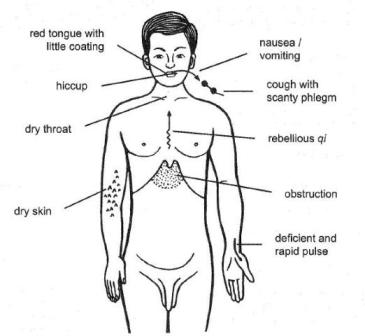Commonly Used Chinese Herb Formulas with Illustrations - Ophiopogon Combination (Mai Men Dong Tang)
1104 麥門冬湯 (Mai Men Dong Tang)
Ophiopogonis Decoction
【Formulation】
|
Chinese Name |
Pharmaceutical name |
Pin Yin Name |
English Name |
|
麥門冬 |
Radix Ophiopogonis |
Mai Men Dong |
|
|
人參 |
Radix Ginseng |
Ren Shen |
|
|
制半夏 |
Rhizoma Pinelliae praeparatum |
Zhi Ban Xia |
|
|
炙甘草 |
Radix Glycyrrhizae praeparata cum melle |
Zhi Gan Cao |
|
|
大棗 |
Fructus Jujubae |
Da Zao |
|
|
粳米 |
Semen Oryzae |
Jing Mi |
Oryza |
【Classic Literature Reference】
Jin Gui Yao Lue (Essentials from the Golden Chamber, 206).
Compiler: Zhang, Zhong-jingo
【Indications】
Traditional:
1. Lung yin deficiency marked by cough, flushing-up, spitting of saliva, dry mouth and throat, a heat sensation in the palm and feet, a red tongue with little coating, and a deficient and rapid pulse.
2. Stomach yin deficiency marked by nausea, vomiting, thirst, dry throat, a red tongue with little coating, and a deficient and rapid pulse.
Modern:
Upper respiratory tract infection, nonspecific pneumonia, laryngopharyngitis, bronchitis, bronchiectasis, gastritis, peptic ulcer, morning sickness, pertussis, tuberculosis of the pharynx, pulmonary tuberculosis, hoarseness or loss of voice, hypertension, and arteriosclerosis.2-5
Pattern of Lung / Stomach Yin Deficiency
【Herbs and Actions】
Join our member to get full-text article! Join Free!
【Pharmacological Studies】for members only
【Clinical Applications】for members only
【Precaution & Contraindication】for members only
【References】for members only

